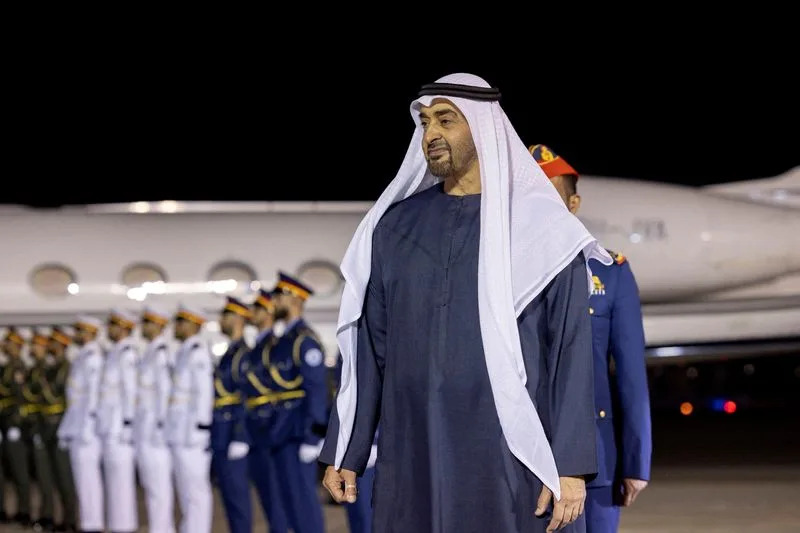The United Arab Emirates (UAE) foreign minister has met a senior Palestinian Authority (PA) official in Abu Dhabi where they discussed international efforts to achieve a ceasefire in Gaza, the Emirati state news agency reported on Thursday.
President of the UAE Sheikh Mohamed bin Zayed Al Nahyan meets with Jordan's King Abdullah, in Abu Dhabi.
Sheikh Abdullah bin Zayed Al Nahyan met Palestine Liberation Organisation (PLO) Secretary General Hussein Sheikh to also discuss the humanitarian crisis in the coastal enclave.
In the meeting, Sheikh Abdullah stressed the importance of prioritising negotiations towards a framework for a two-state peace deal between the Israelis and Palestinians, WAM reported.
The UAE, a Gulf power, is one of few Arab states that has official diplomatic relations with Israel. It established ties in 2020 under a U.S.-brokered deal that paved the way for other Arab states to build their own relations with Israel.
Fellow Gulf state Qatar has been mediating negotiations with Israel for the release of hostages and for a ceasefire.
Qatar and Egypt mediated between Israel and Hamas in the late November truce during which Hamas released 110 women, children and foreigners it was holding in exchange for 240 Palestinian women and teenagers freed from Israeli jails.
Abu Dhabi has condemned the Oct. 7 Hamas attack and called on the Palestinian Islamist group to release hostages held in Gaza. The Gulf state has also condemned Israel's bombardment of the enclave and used its non-permanent seat on the United Nations Security Council to push for a ceasefire in the war.
Plans for postwar Gaza brew as new truce talks accelerate.
Discussions about Gaza’s postwar future are gaining momentum even as fighting in the enclave intensified on Thursday and there was no breakthrough on a new ceasefire deal.
The U.S. said, however, that “serious negotiations” were taking place for another temporary truce and the release of more Israeli hostages.
SIGNALS
Hamas in talks about how to govern Gaza
Hamas is preparing for an end to the war. The militant group, whose political wing is based in Qatar, has started talks with the Palestinian Authority and Palestinian Liberation Organization to determine a governance structure for the Gaza Strip after the conflict is over, The Wall Street Journal reported. Israel has said it does not want to reoccupy Gaza, meaning groups must establish a system to handle the enclave’s affairs. Appointing the Palestinian Authority as a governing body in the area has been floated by Washington, but Israel opposes the plan.
Saudi think tank, France discuss Gaza plan
A Saudi Arabian think tank has developed a plan that would see Hamas’ leadership exiled to Algeria, and forge a multi-nation peacekeeping force led by Arab states, France’s Le Monde reported. The status of the proposal, which was developed during a meeting between officials from the French foreign affairs ministry and the director of the Gulf Research Center, is unclear. The document also raises the possibility of combining representatives from Hamas, the Islamic Jihad, and Fatah to manage the Gaza Strip for four years and establish an elections structure.
US clashes with Netanyahu on two-state solution
Israeli Prime Minister Benjamin Netanyahu has long opposed the establishment of a Palestinian state. Many nations, including the U.S., have backed a two-state solution as the way out of the conflict. But Netanyahu has resisted such calls, saying this week that he was “proud that I prevented the establishment of a Palestinian state,” a position that has created tension with Washington. Officials view Netanyahu’s stance as an obstacle to ending violence between Israel and Palestinians, The Soufan Center noted in a recent report: “U.S. leaders might lack the leverage to compel Netanyahu to align his positions with theirs, leaving Washington with few options other than to hope for the collapse of Netanyahu’s governing coalition.”




